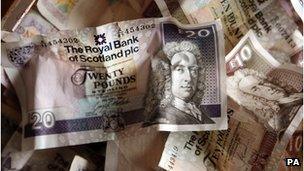R3 study says 'zombie' firm rate is worst in UK
- Published

The study indicated 7% of firms struggled to pay their debts on time
Scotland and Northern Ireland have almost double the rate of "zombie" companies than the rest of the UK, according to research by insolvency trade body R3.
A total of 30,600, or 18%, of Scottish and Northern Irish businesses reported they were only just staying afloat.
This was double the UK average of 9% and the highest figure for any UK area.
A business is defined as a zombie if it can only service the interest on debt, but not the debt itself.
According to the research, 7% of Scottish and Northern Irish firms said they struggled to pay their debts on time, while the same percentage said they were negotiating payment terms with their creditors.
R3 council member for Scotland, John Hall, said: "Any change in circumstance could push many of these businesses into insolvency as they have no financial flexibility to cope with increased costs.
"Many of these businesses may continue to exist for several more years and be unable to invest in equipment or training for staff, which is likely to contribute to further economic stagnation."
'Real concern'
He added: "Given that the Governor of the Bank of England, Sir Mervyn King, gloomily predicted that Britain 'may be in for a period of persistently low growth', there is real concern that we may be about to experience large scale corporate failures."
Corporate insolvency rates in Scotland have been high in recent times.
Over the last four quarters 1,582 Scottish companies have gone bust - more than twice as many as the whole of 2009.
John Hall added: "There is an argument that the benign interest rate regime and more flexible response from lenders has kept corporate failures artificially low.
"This is certainly the case in England and Wales, but we can see that Scotland still has a very high rate of failures and an enormous number of 'zombie' firms waiting in the wings for the slightest adverse change to close them down."
Meanwhile, research by KPMG on zombie companies suggested the construction and real estate sector was experiencing the worst effects of the downturn.
The study found that bank "work out" teams, who deal with companies in distress, were predicting a hike in the number of formal insolvencies and increased activity in distressed mergers and acquisitions.
'Biggest threat'
Blair Nimmo, head of restructuring at KPMG in Scotland, commented: "While last year, the banks believed the biggest threat to zombie companies was a rise in interest rates, this year the banks believe the economic situation is now the biggest threat.
"If worsening GDP figures weren't evidence enough, our zombie company research shows urgent action is needed to stave off a worsening situation."
He added: "With construction and real estate at the top of banks' danger lists, the UK Guarantees scheme to boost infrastructure investment should be seen as an important step in the right direction."
- Published13 November 2012
- Published2 November 2012
- Published1 October 2012
- Published16 July 2012